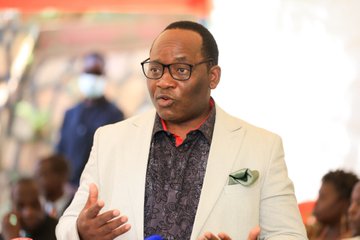Mpuuga Faces Skepticism Over Six-Point Agenda for Political Transition
Political analysts and opposition politicians have expressed doubts over the likelihood of Nyendo Mukungwe Member of Parliament (MP) Mathias Mpuuga successfully realizing his six-point agenda aimed at fostering a peaceful political transition in Uganda. Mpuuga, who serves as the leader of the opposition in parliament, has been a vocal advocate for reforming Uganda’s electoral system […] The post Mpuuga Faces Skepticism Over Six-Point Agenda for Political Transition appeared first on Watchdog Uganda.

Political analysts and opposition politicians have expressed doubts over the likelihood of Nyendo Mukungwe Member of Parliament (MP) Mathias Mpuuga successfully realizing his six-point agenda aimed at fostering a peaceful political transition in Uganda.
Mpuuga, who serves as the leader of the opposition in parliament, has been a vocal advocate for reforming Uganda’s electoral system and eliminating military interference in political processes. However, critics question whether his ambitious goals can overcome the entrenched political realities in the country.
One of the key aspects of Mpuuga’s agenda is to dismantle the military’s pervasive influence in Uganda’s politics. He seeks to ensure that the army does not interfere in the country’s electoral processes. Yet, critics have pointed out that such a move would require the consent of the nation’s commander-in-chief, President Yoweri Museveni, who has maintained a tight grip on power for over three decades.
“People hang on to power, sometimes because they fear that there’s no framework to save them from the crimes they have committed while in power,” Mpuuga said, alluding to the resistance to reforms among those currently in power. He believes that the desire to avoid accountability for past actions may explain why many political leaders are hesitant to relinquish control.
However, the road ahead for Mpuuga remains fraught with challenges. Political analysts argue that although the demand for electoral reforms has been a consistent theme in Uganda’s political discourse for over two decades, tangible progress has been minimal.
John Musisi, a seasoned political analyst, questioned Mpuuga’s ability to deliver meaningful change, citing the failure of previous reform efforts.
“If you are making any proposal, you look at how feasible it is by examining past and present contexts,” Musisi said. “Without that, it’s just rhetoric. I think what Mpuuga needs to do is introspect and figure out why past efforts failed, and propose a solution that can gain traction, particularly with the ruling NRM party.”
The National Resistance Movement, Uganda’s ruling party, has long been accused of suppressing opposition movements and manipulating electoral outcomes. Mpuuga’s calls for reform face skepticism not only from the ruling government but also from certain sectors of the public that fear that any change in power dynamics might result in even greater instability.
Despite these concerns, some experts argue that Mpuuga’s efforts are commendable, given the complexities of Uganda’s political environment. Lawrence Sserwaada, the Executive Director of the Inter-Party Organization for Dialogue (IPOD), reflected on the failure of past efforts to introduce reforms. “Just recently, three years ago, Honorable Norbert Mao, when he was defending the cooperation agreement, talked about issues of transition, reconciliation, and constitutional reform,” Sserwaada said. “But these efforts have faltered, mainly because of resistance at the implementation stage.”
The failure to enact reforms in Uganda has been a key issue leading up to each election cycle. Past elections have been marred by violence, arrests, and allegations of fraud, as seen in the 2020 elections. Citizens have continued to demand reforms to ensure free, fair, and transparent elections, but with little tangible change over the years.
However, some political figures, including Dr. Tanga Odoi, the chairman of the NRM Electoral Commission, have expressed cautious support for Mpuuga’s efforts.
“Mpuuga is right as an MP, he’s a seasoned member of the House. He was a commissioner in Parliament. He has the right to table what he is tabling, and I think the timing is good,” Odoi said. “He knows the procedure, so I wish him well. I don’t think we should lament about what Mpuuga is doing next.”
Despite Odoi’s positive remarks, the broader political landscape suggests that Mpuuga faces an uphill battle in pushing his six-point agenda forward. As the country approaches the next election cycle, the calls for reform grow louder, but the resistance from powerful political forces, including Museveni’s administration, threatens to stifle any real progress.
The outcome of Mpuuga’s efforts will depend on his ability to navigate Uganda’s complex political terrain, gain broader support within the opposition, and most critically, convince President Museveni and the ruling NRM party to accept reforms that could undermine their hold on power.
The post Mpuuga Faces Skepticism Over Six-Point Agenda for Political Transition appeared first on Watchdog Uganda.


